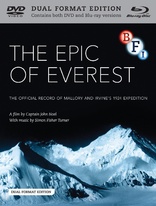The Epic of Everest Blu-ray Movie
HomeThe Epic of Everest Blu-ray Movie 
Blu-ray + DVDBFI Video | 1924 | 87 min | Rated BBFC: U | Jan 27, 2014
Movie rating
7.4 | / 10 |
Blu-ray rating
| Users | 4.3 | |
| Reviewer | 4.5 | |
| Overall | 4.4 |
Overview
The Epic of Everest (1924)
The official record of George Mallory and Andrew Irvine's 1924 Everest expedition.
Starring: Andrew Irvine, George MalloryDirector: Captain John Noel
| Documentary | Uncertain |
| History | Uncertain |
| Adventure | Uncertain |
Specifications
Video
Video codec: MPEG-4 AVC
Video resolution: 1080p
Aspect ratio: 1.33:1
Original aspect ratio: 1.33:1
Audio
Music: DTS-HD Master Audio 5.1
Music: LPCM 2.0
Music: LPCM 2.0
Subtitles
None
Discs
50GB Blu-ray Disc
Two-disc set (1 BD, 1 DVD)
DVD copy
Playback
Region free
Review
Rating summary
| Movie | 4.5 | |
| Video | 5.0 | |
| Audio | 5.0 | |
| Extras | 4.5 | |
| Overall | 4.5 |
The Epic of Everest Blu-ray Movie Review
Reviewed by Dr. Svet Atanasov April 14, 2014Captain John Noel's "The Epic of Everest" (1924) arrives on Blu-ray courtesy of the British Film Institute. The supplemental features on the disc include new filmed video introduction with Sandra Noel; new video interview with composer Simon Fisher Turner; the original 1924 score for the film recreated by Julie Brown and performed by Cambridge University Chamber Orchestra, conducted by Andrew Gourlay; additional musical pieces that accompanied the film on its first screening; and more. The release also arrives with a 28-page illustrated booklet featuring Wade Davis' essay "The tragic mountain"; Sandra Noel's essay "The story of the Mount Everest stamp 1924"; notes on the restoration by Kieron Webb; notes on the new score; notes on the recreation of the 1924 score by Julie Brown; and more. With English intertitles. Region-Free.
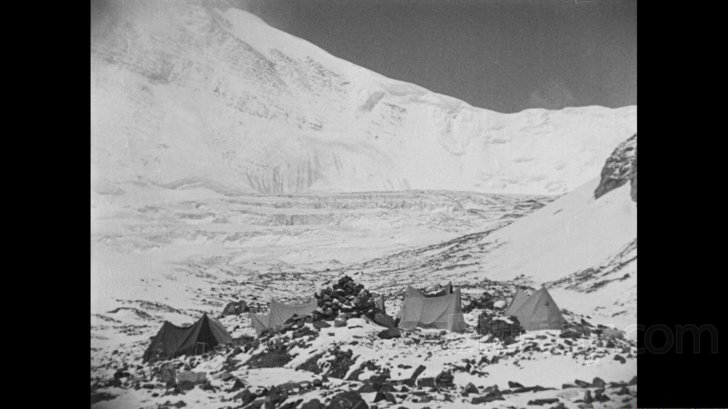
"Could it be possible that we fought something beyond our knowledge? Could it be, as these mystic people say, that this terrible mountain lives and is spirit guarded?"
The Epic of Everest is unlike any other early silent film that I have seen. It chronicles a remarkable true event -- British climbers George Mallory and Andrew Irvine’ attempt to reach the summit of Everest -- but it looks and feels like an unusually long melancholic dream. I am not exaggerating. It has been recently restored and reconstructed by the British Film Institute and it is presented with one of the most atmospheric film scores that I have heard to date.
The film was shot by Captain John Noel in 1924. Equipped with numerous custom-made cameras, Noel followed closely Mallory and Irvine as they reached the Himalayas and then started climbing Everest. But this was not the first time Noel filmed the legendary mountain. In 1922, he attempted to reach the summit of Everest and filmed his efforts. His attempt failed, but the footage he shot during the expedition formed the foundation for the documentary film Climbing Mount Everest.
The Epic of Everest is broken into multiple uneven episodes. Some highlight the unique dilemmas the climbers and their high-altitude porters were presented with during their journey through the Himalayas -- excellent intertitles clarify the climbers' progress and the decisions they had to make -- while others focus on the dangerous beauty of Everest. It is all done with a tremendous sense of balance and a great deal of admiration for the purpose of the journey.
Early in the film Noel’s enthusiasm is incredibly easy to detect. The shooting conditions must have been very difficult (loose rocks everywhere, massive ice fields, bitterly cold weather), but the positioning of his camera is always remarkably precise. There are spectacular panoramic vistas and strikingly well framed close-ups of faces that reveal a wide range of emotions. Later on, as the climbers move further up the mountain, the footage reveals greater awareness of the fact that lives can be lost at any time. There is still an obvious poetic element in the manner in which Noel points his camera at the mountain and films it, but the feeling that this is a dangerous place where people become truly insignificant permeates every single frame.
The film ends abruptly -- lives are lost and questions are left unanswered. Noel’s final footage shows Everest looking calm and proud, beautiful yet unforgivingly dangerous.
***
The Epic of Everest was restored in 4K by BFI National Archive and Deluxe Digital, with funding provided by The Eric Anker-Petersen Charity. The basis for the restoration were two existing copies of the film -- an exhibition print without intertitles and an incomplete positive, which was donated to the BFI by Sandra Noel, the daughter of director Noel. During the restoration, the film’s original intertitles were also reconstructed, and the colors of the tones and tints reproduced as best as current digital technology allows.
For the new 4K restoration of The Epic of Everest, the BFI commissioned a brand new score by Simon Fisher Turner (The Great White Silence). The film’s original 1924 score is also included on the Blu-ray. It was recreated by Julie Brown and performed by Cambridge University Chamber Orchestra, conducted by Andrew Gourlay.
The Epic of Everest Blu-ray Movie, Video Quality 
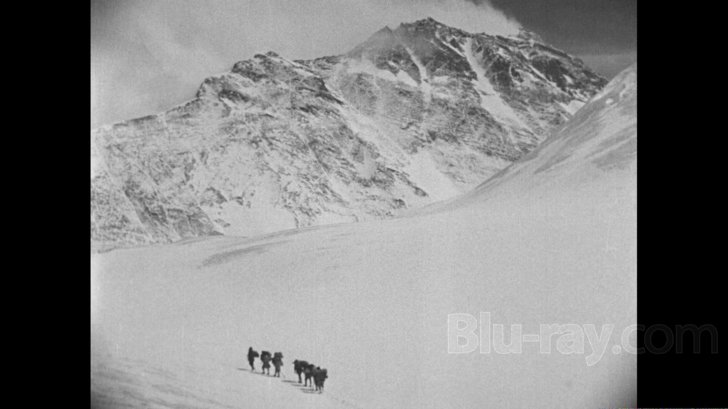
Presented in its original aspect ratio of 1.33:1, encoded with MPEG-4 AVC and granted a 1080p transfer, Captain John Noel's The Epic of Everest arrives on Blu-ray courtesy of the British Film Institute.
The following text appears inside the booklet provided with this Blu-ray release:
"The Epic of Everest has been restored from nitrate positives held by the BFI National Archive. All intertitles have been reconstructed and restored from the original film. Restoration supported by The Eric Anker-Petersen Charity."
The new 4K restoration of The Epic of Everest -- undertaken in collaboration with Sandra Noel, the director's daughter -- is wonderful. Indeed, despite the fact the overwhelming majority of the film was shot with special equipment and frequently under incredibly harsh conditions, clarity and detail are consistently very good. In fact, various close-ups boast such remarkable depth that it is difficult to believe that The Epic of Everest was completed in 1924 (see screencapture #5). The panoramic shots are equally impressive, but it is very easy to see that occasionally the weather wasn't cooperating and the heavy winds and snow presented all sorts of different dilemmas for the director. Furthermore, excluding some minor source limitations contrast and sharpness levels remain stable. Interestingly enough, there are no serious transition issues either; it appears that various very important enhancements were performed to stabilize the image as best possible. (This becomes particularly obvious in areas where intertitles were reinstated). Because of the high-quality scanning, grain appears exceptionally tight and beautifully resolved. Needless to say, the film has a wonderful organic appearance. Finally, damage marks, cuts, debris, and various other age-related imperfections have been removed as best as possible. All in all, this is an outstanding restoration and presentation of The Epic of Everest which should remain the film's definitive presentation on the home video market. (Note: This is a Region-Free Blu-ray release. Therefore, you will be able to play it on your PS3 or SA regardless of your geographical location. For the record, there is no problematic PAL or 1080/50i content preceding the disc's main menu).
The Epic of Everest Blu-ray Movie, Audio Quality 
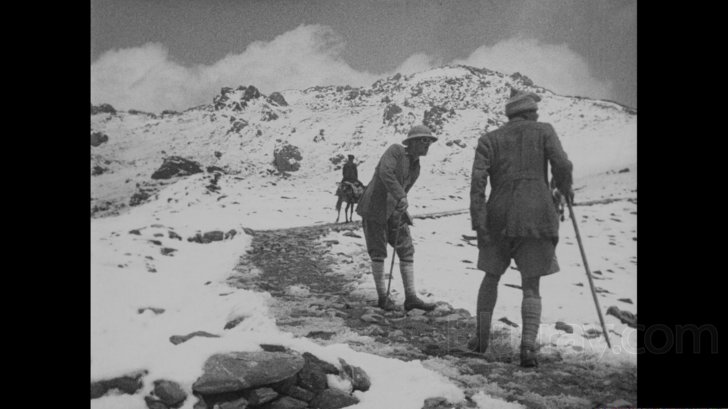
There are three standard audio tracks on this Blu-ray release: Music DTS-HD Master Audio 5.1 (Simon Fisher Turner score) Music LPCM 2.0 (Simon Fisher Turner score), and Music LPCM 2.0 (Reconstructed 1924 score). The film's original English intertitles have been restored and reconstructed.
The film is presented with a brand new orchestral score by Simon Fisher Turner, who also scored the equally impressive The Great White Silence. The score, one of the best I have heard created for a silent film, benefits tremendously from the lossless treatment. In fact, the sound is so lush and nuanced that it literally transforms the entire film. (Criterion's Blu-ray release of Victor Sjostrom's silent masterpiece The Phantom Carriage has an equally atmospheric score created by the experimental duo KTL). I prefer the 5.1 track, but I did some random comparisons with the LPCM 2.0 track and I think that both serve the film exceptionally well.
The Epic of Everest Blu-ray Movie, Special Features and Extras 
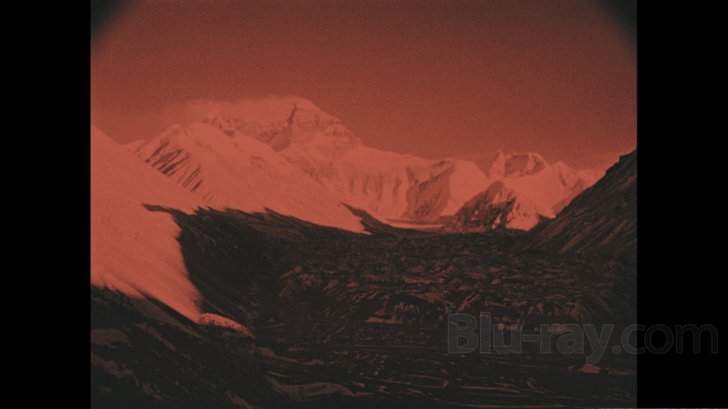
- Introducing The Epic of Everest - Bryony Dixon, curator at BFI National Archive, introduces Captain John Noel's The Epic of Everest and explains what makes it such a remarkable film. Also included are comments by Sandra Noel, the director's daughter. In English, not subtitled. (9 min, 1080p).
- Restoring The Epic of Everest - in this short video piece, Bryony Dixon, Lisa Copson (Digital Restoration Operator/Deluxe Digital), and Ben Thompson (Image Quality-Section Leader/BFI National Archive) discuss the new 4K restoration and reconstruction of The Epic of Everest. In English, not subtitled. (7 min, 1080p).
- Scoring The Epic of Everest - the BFI commissioned a new score by Simon Fisher Turner for the new 4K restoration and reconstruction of The Epic of Everest. In this video interview, the artist explains how the new score came to exist and discusses its unique qualities. In English, not subtitled. (9 min, 1080p).
- Alternative Score - the original 1924 score recreated by Julie Brown and performed by Cambridge University Chamber Orchestra, conducted by Andrew Gourlay.
- Additional Musical Pieces - these additional musical pieces accompanied the film on its first screening at the Scala in 1924.
1. Prelude to Part I, Untitled. Audio only. The following text is provided by the BFI: "The first element in a three-part prelude which preceded the first half of The Epic of Everest in London in 1924. This piece is unattributed, but seems likely to have been composed either by mountaineer T. Howard Somervell, who composed the other Tibet-themed music, or by Frederick Laurence, the composer half of the score's arranging team." (4 min).
2. Prelude to Part I, Tibetan Lamas. Audio only. The following text is provided by the BFI: "Original recording of the Tibetan lamas and monks brought to London by Captain Noel to perform as part of the atmospheric opening prelude to the film. This recording was taken in 1925, apparently while Noel was on tour in Germany or Austria with the lamas. Although it is not known whether this mixture of monastic and secular music reflects precise content of he lamas' music and dance performance at the New Scala Theater in London in 1924, it seems reasonably likely." (6 min).
3. Prelude to Part II, 'Tibetan Pastoral Music'. Audio only. The following text is provided by the BFI: "The third piece in a three-part Prelude to the second half of the film. Composed by one of the mountaineers, who was also an amateur musician, this was created for screenings of Climbing Mount Everest (J B L Noel, 1922). Suposedly drawing on themes collected in Tibet, it was arranged for piano as part of The Mount Everest Suite. In 1924 in London it followed a lecture given by members of the mountaineering party." (4 min).
4. The Mount Everest Suite: Airs of Tibet and Nepal. Audio only. The following text is provided by the BFI: "This is a collection of four short Tibet-themed pieces: 'Airs from Nepal and Sikkim', 'Tibetan Pastoral Music', 'Beggars' Tunes', and 'The Lama Dances'. They were composed by one of the mountaineers and subsequently arranged for piano in order to be sold as sheet music at screenings of Climbing Mount Everest (J B L Noel, 1922); the aim was to raise funds for the following expedition. No only did these funds help to pay for the expedition documented in The Epic of Everest, but some of the music was also re-used for its screenings." (12 min).
- Booklet - 28-page illustrated booklet featuring Wade Davis' essay "The tragic mountain"; Sandra Noel's essay "The story of the Mount Everest stamp 1924"; notes on the restoration by Kieron Webb; notes on the new score; notes on the recreation of the 1924 score by Julie Brown; and technical credits.
- Original Program - original 1924 film program (downloadable PDF, DVD only).
The Epic of Everest Blu-ray Movie, Overall Score and Recommendation 
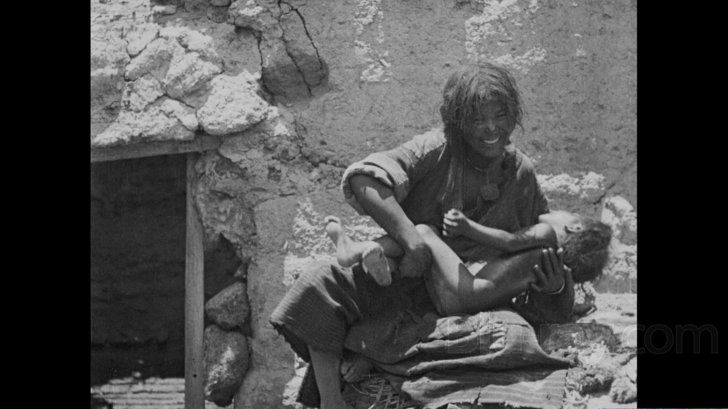
Recently restored and reconstructed by BFI National Archive and Deluxe Digital, Captain John Noel's The Epic of Everest is one of the most unusual early silent films that I have seen. At its core it is a documentary feature, but there is a uniquely poetic element in it that frequently makes it look and feel like a very long melancholic dream. The film's special atmosphere is now further enhanced by a spectacular new ambient score composed by Simon Fisher Turner, who also scored the equally impressive The Great White Silence. Kudos to BFI for producing this truly outstanding Blu-ray release. It is one of the best presentations of a silent film that I have seen since the high-definition format was launched. VERY HIGHLY RECOMMENDED.
Similar titles
Similar titles you might also like

The Great White Silence
1924

South & The Heroic Age of Antarctic Exploration on Film
1919

Dawson City: Frozen Time
2016

Hitler's Hollywood
Includes From Caligari to Hitler
2017

For All Mankind
1989

Hearts and Minds
1974

Notfilm
2015

The Story of Film: An Odyssey
2011

Helicopter Canada
1966

No Home Movie
2015

The Look of Silence
2014

Women Make Film: A New Road Movie Through Cinema
2018

Leviathan
2012

The Times of Harvey Milk
1984

Symbiopsychotaxiplasm: Take One
1968

Grey Gardens
1975

Around the World with Orson Welles
1955

Dick Johnson Is Dead
2020

Lynch/Oz
2022

The Creeping Garden
Arrow Academy | Limited Edition
2014
